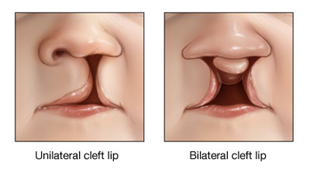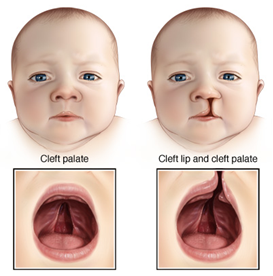There are two types of cleft lip:
- unilateral cleft, where the cleft occurs on one side of the lip
- bilateral cleft, where the cleft occurs on both sides of the lip
The appearance of the cleft can be anything from a small notch in the lip (incomplete
cleft) to a wide gap that runs all the way up to the nostril (complete cleft lip).
The appearance of a cleft palate can be anything from an opening at the back of
the soft palate towards the throat to an almost complete separation of the roof
of the mouth.
As well as affecting appearance, a cleft lip and palate can also cause a number
of associated symptoms, outlined below.
Feeding Problems
Babies with a cleft may have problems feeding, particularly if the cleft includes
the palate because the baby may not be able to suck adequately. However, with assistance
and sometimes the use of a special feeding bottle, feeding can usually be quickly
established.
Ear Infections and Hearing Impairments
Children with a cleft palate often develop a condition called glue ear, where sticky
fluid collects in the middle ear behind the eardrum. This may reduce the level of
hearing and can sometimes cause ear infections. Therefore, it is important that
all children with a cleft palate have their ears and hearing checked regularly.
Speech and Language Problems
The palate plays an important role in helping your child form normal sounds for
speech.
If a cleft palate is not repaired with surgery, it will lead to speech problems
when the child is older. Therefore, the cleft palate is carefully repaired before
speech development so that, in many cases, the child goes on to develop normal speech.
About half of all children with a repaired cleft palate will need speech therapy,
and a small number may need further surgery. Over time, a specialist speech and
language therapist will monitor the child’s speech development.
About half of all children with a repaired cleft palate will need speech therapy,
and a small number may need further surgery. Over time, a specialist speech and
language therapist will monitor the child’s speech development.
Dental Health
A cleft lip and palate can cause changes to the structure of the mouth and lead
to problems with the development of teeth, making children more vulnerable to tooth
decay. It is therefore important for the child to have their teeth checked and closely
monitored regularly.
Psychological Issues
A cleft lip or palate can have a psychological impact on both child and parents.
For example, parents may feel guilty or angry. Psychological support and counseling
may sometimes be required.





